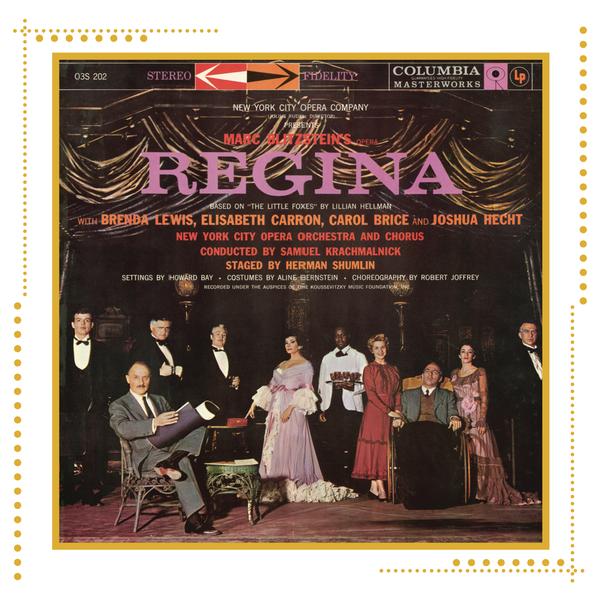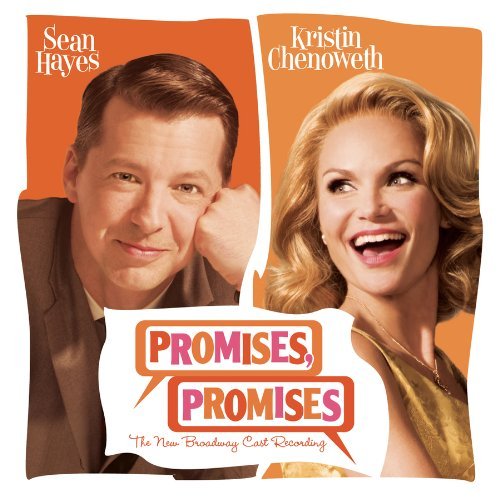Long considered a Holy Grail recording by musical theatre enthusiasts, the 1958 NYCO cast album of Marc Blitzstein‘s Regina has been released by Masterworks Broadway for the first time since its LP release. An opera based on Lillian Hellman’s The Little Foxes, Regina premiered on Broadway in 1949, running a mere 56 performances. While other Broadway operas, such as Street Scene and The Consul received original cast albums (even if they were highlights), Regina didn’t get recorded for nine years. (Though there is a piano only recording of certain musical numbers recorded after the original closed).
The Little Foxes, one of Hellman’s most famous plays, is a melodramatic study of an avaricious, desperate Southern aristocracy in decline. Tallulah Bankhead played the role of Regina Hubbard Giddens, who finds herself at odds with her brothers and husband, the result of patriarchal societal mores. She fights the gender oppression as best she can, doing what she must to get what she wants but at a considerable cost. Due to its extreme characters and heightened emotions (to say nothing of its malicious cynicism), it’s ideal for operatic consideration. (I won’t go into the plot details here. You’d have more fun seeing the film or a local production than reading a synopsis).
The opera was culled from obscurity by the City Opera in 1958 which made some alterations from the Broadway production. Blitzstein envisioned a three act opera utilizing musical idioms prevalent to the American South at the turn of the 20th century. On Broadway, he was forced to edit the piece to two acts and Hellman was very stringent regarding the dramatic structure. For NYCO, the opera was returned to its three act form, but there were some more revisions and the excision of an onstage Dixie band. The show was first performed in 1953, and revived in 1958 when Columbia stepped in to record. It may not be the complete opera, but it’s a lively 2 disc recording from the first notes of its prologue to its unbelievably breathtaking finale.
Brenda Lewis, who played Birdie in the original Broadway production, graduates to the role of Regina and sings the role with a dramatic intensity worthy of her predecessors in the play. She is especially memorable with the insistent “The Best Thing of All.” Her performance builds to a fever pitch as she does battle with her dying husband with “Do You Wish We Had Wed Years Ago?” and all but explodes with the climactic high C during the “Gallop” as she ominously tells him “I’ll be waiting.” Regina is fascinating: she’s conniving, ruthless, steely, determined and flirtatious all in one fell swoop. Lewis is nothing short of extraordinary.
And then there’s Birdie, the fading southern belle who receives malicious abuse from her unloving husband and son while dreaming of her childhood. The role is a show stealer, and is pretty much the audience favorite. Patricia Collinge, who originated the role in the original production preserved her performance in the classic 1941 William Wyler screen adaptation, presents a characterization of such startling realism and honesty, that she all but steals the film from star Bette Davis and was Oscar nominated. Here in Regina, the part also walks away with the best of the score, most especially her confessional aria in the third act “Lionnet…Lionnet.” This showstopper sets to music one of the most famous monologues from the play, where Birdie admits her alcoholism to her beloved niece. She also admits that her husband married her for her family’s estate and that she hates her own son. It’s a glorious piece of dramatic writing, and soprano Elizabeth Carron is glorious.
The supporting cast is superb. Loren Driscoll sings the role of Birdie’s disagreeable son Leo (and would go onto sing “One Kind Word” in Blitzstein’s Juno the following year). Joshua Hecht’s bass makes an imperious impression as Regina’s husband Horace. George S. Irving and Emile Renan are excellent as the two conniving and deceitful brothers. Carol Brice (The Grass Harp) lends her supple contralto to the expanded role of Addie, the family’s housekeeper, while I would have much preferred Broadway original William Warfield singing the role of Cal. Helen Strine, as Regina and Ben’s daughter Zan, sings the recitative with a youthfulness that disappears during her one major number.
I’ve heard the score before, on a 1992 recording from the Scottish opera. Most interestingly, I didn’t care for the piece at all. But with this recording, it’s like hearing the work for the first time. The opera comes alive in a way the restored version does not (the only things I really remember from that one is the end of the “Gallop” and Birdie’s aria. Hearing it on this NYCO album leads me to wonder – isn’t it about time we had the chance to see Regina in NY again? If there’s a case to be made for another production at NYCO (or anyone else who might consider it), it’s this riveting cast album. The album is available as a digital download or CD-R via ArkivMusic.








